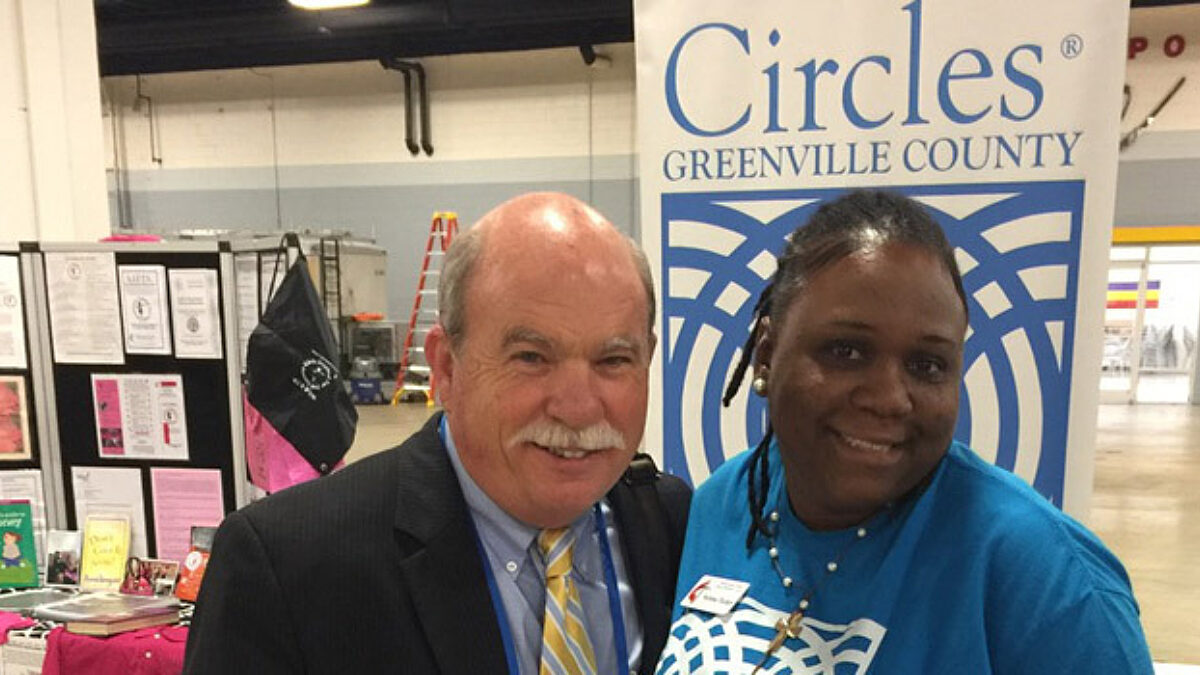
Circles poverty effort expands across S.C.
Mount Horeb starts new chapter; Buncombe Street to begin second cycle in January
By Jessica Brodie
A relationship-based effort to break the cycle of poverty is working its way across South Carolina, and United Methodist churches are getting solidly on board.
Circles, a nationwide campaign that teams low-income families with community allies to carve a long-term pathway out of poverty, began in South Carolina at Buncombe Street UMC, Greenville, in September 2015. Now, its first group of families has “graduated,” and a statewide Circles push is gaining momentum. Mount Horeb UMC, Lexington, has started its own Circles chapter and funded a statewide planning grant to look at how other UMCs can do this throughout the state. Other churches are in the learning process and working on launching their Circles chapters, too. And at Annual Conference 2017, it was announced that Circles is the new mission project of South Carolina’s Children in Poverty Task Force with a goal to reduce the number of children and families in poverty by 10 percent.
“It’s so needed,” said Toni Taylor, ambassador for the newly launched Circles South Carolina, which is under the umbrella of Circles USA. “There are 289,000 children in South Carolina living in poverty—that’s a lot. There are 1,000 United Methodist churches. United Methodist churches can make such a difference.”
A hands-up, not a hands-out
A member of Grace UMC, Pickens, Taylor said Circles is “a hands-up rather than a hands-out.” The way it works is that families in poverty, as well as volunteers to work with them, are identified. The families go through 12 weeks of training and then become “circle leaders” to try to lead their family out of poverty. Volunteers who coach them go through training as well and are called “allies,” and then walk alongside them for 18 months to help the circle leaders achieve their goals. There are two allies per circle leader.
“It’s a volunteer-centric model,” Taylor said.
Circles is in 78 communities across the United States; more than half (41) are in UMCs. Circles South Carolina was started so donors can help fund Circles sites at small and large churches, plus educate people about poverty and why people are trapped in it—and how to break the cycle.
The goal is to move the family from 100 percent poverty to 200 percent (e.g., from a $24,000 annual income for a family of four to a $48,000 annual income).
“It’s complicated at times because they have to overcome the ‘cliff effect,’” Taylor said. “For example, if you get a $2 raise you could be bumped into a higher income status, so you lose your childcare benefit. People will tell their employers, ‘Thanks, but I don’t want that raise because it will cause me to lose certain benefits.’”
Circles helps calculate and plan for that, plus helps families find next steps and other resources.
‘Loving with our hands wide open’
Martha Thompson, chair of the Children in Poverty Task Force for the conference and also a member of Mount Horeb, said Circles USA provides a supportive community to reduce poverty, which is critical because one in six people in the United States live in poverty. South Carolina ranks ninth nationwide with children living in poverty, she said, and nationally, 15 percent, or 45 million people, live at or below the income level for the Federal Poverty Guidelines.
“The core values of the task force are to encourage and support families as they struggle to emerge from poverty and to empower people,” Thompson said. “Circles USA gives families the tools to get out of poverty with volunteers and support groups to walk with them in this journey which takes 12 to 24 months.”
In June 2017, Buncombe Street finished its first 18-month Circles cycle. They will start a new one this month (January) helping 12-20 families depending on the number of volunteers who sign up to help. Several graduates from the first group are helping with the second.
Meanwhile, Mount Horeb is in the initial launch phase. It is in the process of hiring needed staff, building community teams and getting organized.
“For us it really started out of just becoming more aware of the effects of poverty with people in our local community,” said Janis Albergotti, missions and children’s ministry director for Mount Horeb. “Through our afterschool program that we do, 10:10 Bridge, a lot of the children in our program are living in poverty, and we found we can love the children all day long and provide educational support for them, but it’s not enough to strategically offer help for the families themselves to lift out of poverty and experience freedom.”
Circles Lexington is the next step for helping this, Albergotti said, and given the size of Mount Horeb—the largest UMC in the conference—they wanted to be able to create a model that would not only help their neighbors but people all over the state.
“I’m so excited about it; I think it’s going to change our church,” Albergotti said. “When God calls us to be in that position where we can pour out and love people sacrificially and love with our hands wide open, God changes us, too. … He grows and changes us and makes us more like Jesus.”
Their Circles is not just open to Mount Horeb volunteers but people all over, including non-Methodists. An orientation is slated for Wednesday, Jan. 31, from 6-7:30 p.m. Two Sunday morning orientations will also be held: Jan. 28 and Feb. 4 during the 9 and 10:45 services. Contact Albergotti for more information at [email protected].
For more on Circles South Carolina and how to help, reach out to Taylor at [email protected] or 864-420-4606.